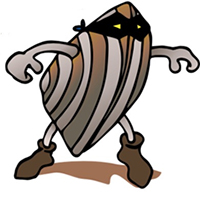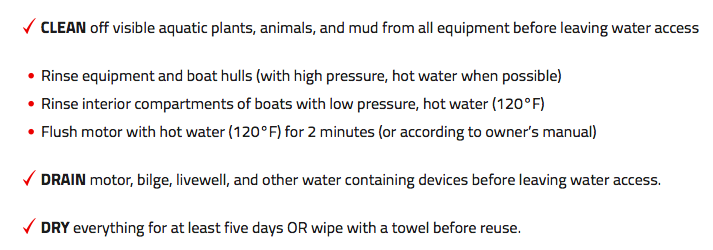By Tim Campbell and Sara Fox
Welcome, and thank you for joining us to conclude the Spring Thaw Throwdown, our competition to determine Wisconsin’s least-wanted aquatic invasive species! I’m sure you’re all anxiously waiting to hear the results, so without further ado…
 After summing up the votes from both Facebook and Twitter, zebra & quagga mussels take the trophy. The combined votes show zebra and quagga mussels at 63%, leaving silver and bighead carp with only 37%.
After summing up the votes from both Facebook and Twitter, zebra & quagga mussels take the trophy. The combined votes show zebra and quagga mussels at 63%, leaving silver and bighead carp with only 37%.
These two teams were extremely well matched, and the championship probably could have gone either way.
It seems the combined effort of zebra and quagga mussels’ established presence all over the state was able to supersede the threat of silver and bighead carp entering the Great Lakes and Wisconsin’s inland waters.
Let’s take a look back at the mussels’ journey: their toughest competition following silver and bighead carp was probably the notorious wetland invader, Phragmites. Phragmites’ defeat was especially surprising, given its wide distribution across the eastern portion of the state. Perhaps zebra and quagga mussels had an advantage simply because they competed on such different terrain than Phragmites.
While the final two competitors were ultimately somewhat predictable–about half of the submitted brackets had them in the finals–we must mention a couple upsets and surprises that took place during the tournament.
Notably, one of Wisconsin’s most recent invaders, the New Zealand mudsnail, didn’t make it past the first round. This pollution-tolerant species can survive degraded water, a trout’s digestive system, and even ammonia. If you’re from the Dane County area, this is definitely a species to take a second look at.
Another one of Wisconsin’s newest invaders, starry stonewort, also didn’t make it as far as we expected. Its ability to carpet a lake bottom is arguably its greatest asset and if we don’t keep an eye on this one, it might just make its way into some of our favorite fishing spots.
After getting to know all these competitors, we definitely don’t want to see any of them spreading in or around our state. The good news is that most of them can be prevented using the same methods of “Clean, Drain, Dry”:
We’ve had a great time analyzing each round of this tournament. Whether you joined us for just one round or followed along the whole time, we appreciate your participation and we hope you learned something new about aquatic invasive species!
We also want to thank everyone who submitted a bracket. While there were a lot of close submissions, only one person had a perfect bracket. Congrats to Ben Martin of UW-Madison for successfully predicting all of the matchups!


